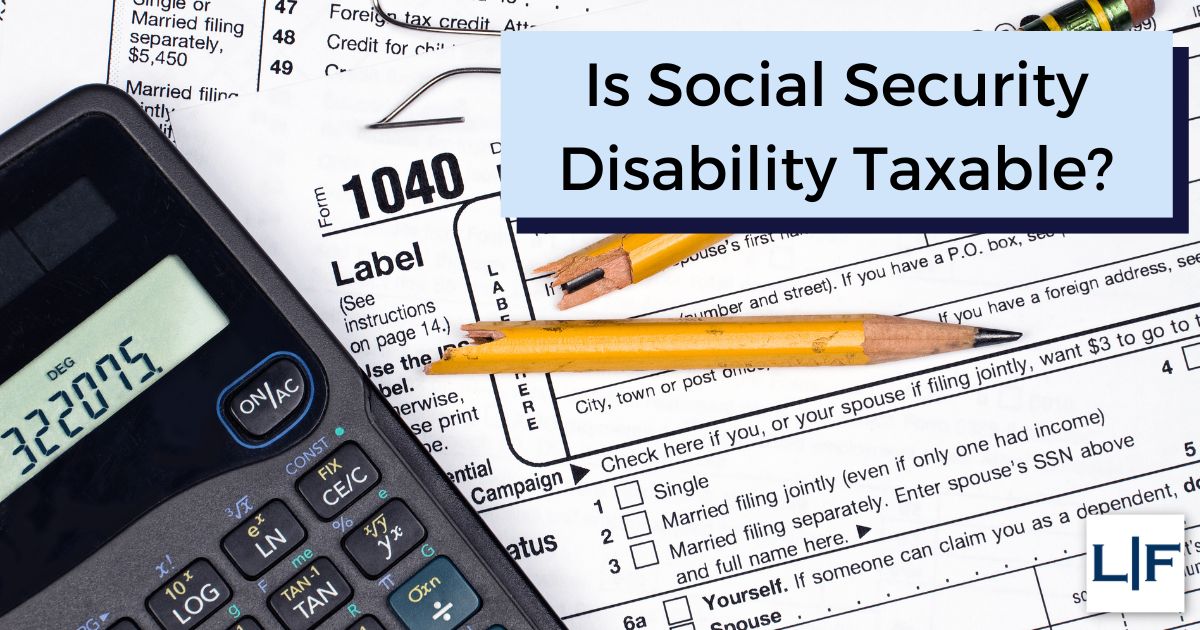What are the income limits for taxable disability benefits?
Your income limits for Social Security Disability Insurance (SSDI) depend on how you file your federal taxes — individual, joint return, married but filing separately.
- If you file your federal income tax return as “individual” status, you can have a base income up to $25,000 without having to pay taxes on your benefits.
- If you file a joint return, you and your spouse can have a combined base income up to $32,000 without having to pay taxes on your disability benefits. You must combine your spouse’s income with your own regardless of whether your spouse receives disability benefits.
- If you are married but file separate federal income tax returns you can have a base income of up to $25,000 but only if you and your spouse lived apart for the entire tax year.
- If you are married but file separate tax returns, and you lived with your spouse at any time during the tax year, your disability benefits will be taxable, regardless of how much other income you have.
For example, Tom receives SSDI benefits. He has $18,000 in other income. He is unmarried and files his federal income taxes as a single taxpayer status. His SSDI benefits are not taxable.
Bob and Lily are married and file a joint tax return. Lily receives Social Security disability benefits. She has a base income of $12,000. Bob has income of $24,000. Because their combined income is more than $32,000, Lily’s disability benefits will be taxable.
According to the Internal Revenue Service (IRS), you can determine your base income by combining half of your benefits with any other income (including tax exempt interest). For example, if you receive $1,500 in benefits a month and your spouse makes $30,000 a year, your base income for tax purposes would be $39,000.
Determining your base income can be complicated. A tax professional can help.
Can married couples avoid taxes by filing separately?
Married couples can avoid paying taxes on Social Security disability benefits by filing separately. However, it might not be in your best interest. According to Intuit TurboTax, you will likely end up paying more in taxes if you file separately. Plus, you cannot file for other deductions that could help you avoid taxes (e.g., the earned income tax credit, child deductions).
Is Social Security disability taxable in North Carolina?
That depends on your state. Most states do not tax disability benefits. Our state is the same. Here in North Carolina, Social Security disability benefits are exempt from state taxation.
Are Supplemental Security Income benefits taxable?
No. The Internal Revenue Service (IRS) does not consider Supplemental Security Income (SSI) benefits as income, so they are not taxable on your federal income tax return. It does not matter how much other income you have. Your filing status and marital status are also irrelevant for purposes of SSI benefits being taxable.
Does Lunn & Forro, PLLC provide help with or advice on taxes?
No. Because we are not tax professionals, we cannot give you advice on your taxes. For help with or advice on your taxes, you should speak with a tax professional — a certified public accountant (CPA) or a tax lawyer.
At Lunn & Forro, PLLC, our practice is dedicated completely to helping people with disabilities navigate the Social Security Disability process to get the financial support they and their families need. While we cannot give you tax advice about your benefits, we can help you get the benefits you deserve. If you are unable to work because of a disability, call our Social Security disability attorneys today at 888-966-6566 to schedule your consultation.
Related Posts

If I Get Disability Benefits Will My Family Also Get Money?
If you are approved for SSDI payments there may be additional money available to your minor children, your spouse, and your disabled adult children. When

Can Disabled Veterans Get Social Security Disability?
Disabled veterans may qualify for both Social Security disability benefits and veterans disability compensation. If you meet the separate requirements of each type of benefit,

How Long Can You Receive Social Security Disability Benefits?
You can receive disability benefits as long as you continue to be eligible. The eligibility rules are different for SSDI and SSI benefits.

Does My Spouse’s Income Affect Social Security Disability Benefits?
Yes, your spouse’s income may affect your Social Security disability benefits, although it depends on the type of benefit you receive.
Will I get Medicare or Medicaid benefits?
Medicaid and Medicare are medical benefits that come with a finding that you are disabled by the Social Security Administration. If you receive SSDI benefits,
Social Security Back pay
The Social Security disability application process can seem rather long and tiring. The Social Security Administration (SSA) receives roughly 2.5 million applications for disability benefits



